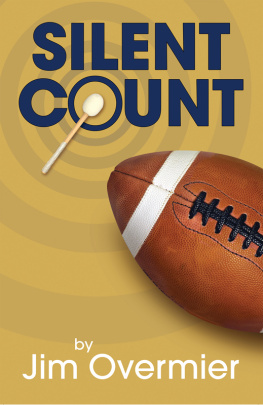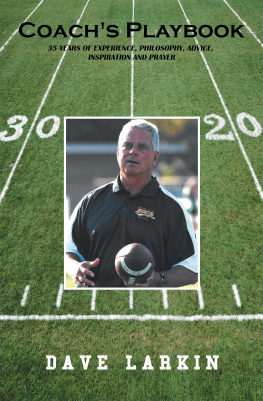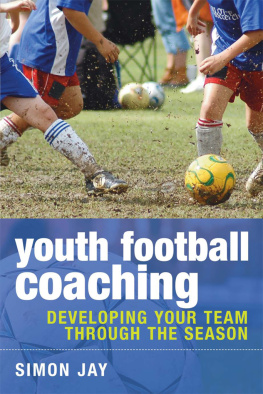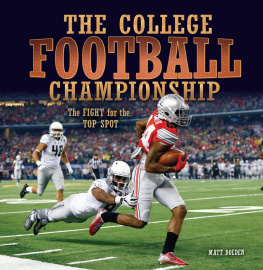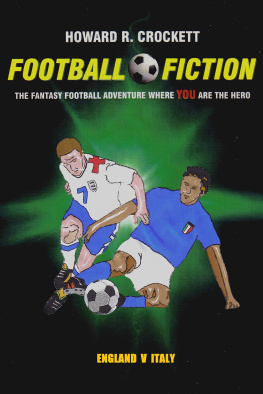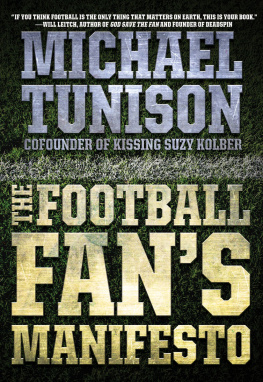

Copyright 2013 by James C. Overmier, Jr.
All rights reserved. This book or any portion thereof
may not be reproduced or used in any manner whatsoever
without the express written permission of the publisher
except for the use of brief quotations in a book review.
Cover design by: Rob Wood / wrh-illustration.com
Printed in the United States of America
First Printing, 2013
ISBN-10: 099129470X
ISBN-13: 978-0-9912947-0-1
eISBN: 9780991294701
www.silentcount-thebook.com
PREFACE
Shortly after accepting the position of quarterback coach at Gallaudet University, I telephoned one of my best friends, Gary Morrow, to share my decision with him. Gary had always been an incredible source of creative ideas for me, and during that conversation he came up with yet another. He suggested that I maintain a daily journal so that I could one day write about what he felt was going to be a really interesting experience. And so Ive done just that.
But why write a book? Some will think I chose to write this book to chronicle the episodic nature of coaching college football. Not true. Some may conclude that Im attempting to bring to light the social adversities faced by the deaf community. Not so. And others may, in their hearts, believe that Ive penned this story just to demonstrate how God works through His faithful servants. Again, that wouldnt be the case. While Id consider it a blessing if God were to use my literary skills for His own glory, it wasnt the motivating factor in me telling this particular story. Although I wouldnt argue the point that perhaps it should have been.
The primary reason that Ive written this book isnt so complex. I simply want to share the story of my unique and wonderfully entertaining experience as a football coach at Gallaudet University. There are but a handful of men with such experience on their coaching resumes, even fewer who were neither deaf nor hearing impaired. Im one of those men. Helping deaf young athletes to achieve their dream of playing college football was quite a rewarding journey, and one that I believe you will enjoy reading about.
*
The transition from high school football coach to college football coach probably happens quite frequently throughout the country, though usually for men much younger than I. But it rarely happens in the way Ill describe. Gallaudet University is a school for the advanced education of the deaf and hard of hearing, and its the only such school in the world. That itself would be enough to make this story interesting. However, what makes my tale particularly unique is that Im not deaf or hard of hearing.
One spring morning in 2007, while sitting in front of a computer at my office, I was perusing an internet website dedicated to local high school football. I was a high school football coach, and had been for more than a decade. Like lots of local high school coaches, I checked the site, and its message boards, on a regular basis. It was a great way to see what was being said about your football program by other coaches and fans from around the state. It was also a convenient place to check on game scores and prognostications as well. Anyway, I came upon a help wanted ad placed in one of the message boards by Gallaudet Universitys new head coach, Ed Hottle. He was looking to hire a quarterback coach. Now, youve often heard that God works in mysterious ways? Well, I guess sometimes He uses the Internet.
You see, I wasnt looking for another coaching position that day. My current coaching job at Severna Park High School in Maryland was perfect for me. We had great kids from solid families and communities, a good coaching staff, and a supportive administration. Plus, it was only a fifteen-minute drive from my home. But coaching quarterbacks was my specialty and, naturally, the ad piqued my interest. I was very intrigued by the possibility of me coaching college football, especially at my advanced age. Many, if not most, high school coaches, aspire to one day coach at the collegiate level. I was no different. And so mostly out of curiosity, I called Coach Hottle and spoke with him at some length about football, and specifically, the job. At the conclusion of our conversation, he offered me an invitation to meet with him on campus for an interview. I accepted his offer.
PROLOGUE
As I drove up to the small gatehouse at the main entrance of Gallaudet University, the worlds only university specifically designed to educate deaf students, a security guard emerged from within the house to greet me. He was a small, black man with a big smile. He didnt appear to have a gun, or a nightstick, or even a small can of mace anywhere on his person. Id thought again that it was odd that the Gallaudet University security guards didnt carry a weapon. After all, the campus was situated in a very tough part of Washington, D.C. where crime was a daily occurrence.
Although he carried no weapon, there were two noticeable hearing aids, one behind each ear. From each hearing aid came a tubular extension that curled from the back of the ear forward, connecting to a flat, disc-like part of the device that sat inside the opening of the ear. He greeted me with the same flashy smile that hed given me each day for the past week, and waved me through with a hearty good morning in sign language. I say hearty because deaf people generally show a good deal of expression when they sign. Its a huge part of their communication process. Usually, Id return the greeting in the same manner which meant extending the back of my right hand from my mouth toward the ground, like blowing a kiss, and then raising it back up with my left hand resting in my right elbow. Its a little tough to do while driving and you have to look at the person to whom youre signing. Not a good idea to sign and drive, though most of the deaf people that I know do it frequently.
On this particular morning, Id planned to demonstrate my developing ASL (American Sign Language) skills by signing to the guard that I was an assistant football coach headed to the field house. ASL is a system of standardized hand gestures and movements used by the deaf to communicate quickly and easily. After a week of coaching football at Gallaudet, Id learned most of my signing skills from the players, a little from the staff, and some from the Internet. I was eager to try it out on someone other than a football player, coach, or trainer.
Good morning, I signed and smiled. Im an assistant football coach and Im going to the field house. I communicated via several gesticulations of my hands and was feeling pretty good about the effort and my ability to now communicate in a different language. My smile broadened.
The guard began to laugh.
What? I signed by drawing my right index finger across the palm of my left hand as I also mouthed the word.
He laughed a bit harder, the palms of his hands extended outward, his head nodded back and forth as he leaned toward me. Coach, he exclaimed in a strong, but noticeably untrained, voice that originated from deep in his throat. You said that youre a shitty football coach going to the field house.
Id screwed it up.
Dont worry, he said, I know that youre not a shitty football coach. He smiled and waved me through the gate, toward the field house.
When you sign the word assistant you make a fist with both of your hands, extend the thumb of your right hand and place it into the bottom of the fist on your left, right into the bend of your left pinky. Leave it there, at least for a second, and gently push your fist upward. It gets a little tricky when you separate your hands, though. If you pull the thumb down and away from your left fist too quickly, youre actually signing a certain four letter word meaning excrement, though I still dont know what the correlation is that would render the signs so similar. I guess its similar to speech. Sometimes, its all about how things are said.
Next page
